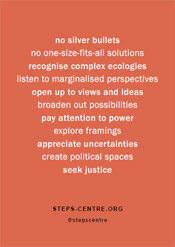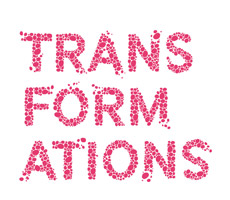Between 2006 and 2021, the ESRC STEPS Centre (Social, Technological and Environmental Pathways to Sustainability) carried out interdisciplinary global research uniting development studies with science and technology studies.
Our mission was to highlight, reveal and contribute to just and democratic pathways to sustainability that include the needs, knowledge and perspectives of poor and marginalised people.
The STEPS Centre was hosted in the UK by the Institute of Development Studies and the Science Policy Research Unit (SPRU) at the University of Sussex. Our main funding was from the UK’s Economic and Social Research Council (ESRC).
In 2022, members of the STEPS Centre established the Centre for Future Natures, which builds on STEPS work to explore the emergent ecologies of commoning and enclosure.
Reflections
Browse a collection of reflections on the STEPS Centre written by our colleagues, collaborators and partners around the world.
Stories of Change
Read our series of stories that explore how the STEPS Centre intervened in processes of change and what we learned.
2018-2021: Themes
From 2018-2021 the STEPS Centre and Global Consortium focused on four annual themes.
 2018: Transformations
2018: Transformations
Faced with a series of social and environmental stresses and shocks, there are urgent calls for radical, systemic change. But, as past and present experience show, this can take many forms. What does it take to make sustainability transformations emancipatory (caring), rather than repressive (controlling)?
2019: Uncertainty
 Uncertainties can make it hard to plan ahead. But recognising them can help to reveal new questions and choices. What kinds of uncertainty are there, why do they matter for sustainability, and what ideas, approaches and methods can help us to respond to them?
Uncertainties can make it hard to plan ahead. But recognising them can help to reveal new questions and choices. What kinds of uncertainty are there, why do they matter for sustainability, and what ideas, approaches and methods can help us to respond to them?
2020: NATURES
 Nature is all around us, but there are many ways of seeing different kinds of ‘natures’, and many efforts to involve it in forms of control or domination. How is talk of crisis shaping nature and people’s views of it? How can colonial forms of knowledge, technology and power be challenged, and what might it mean to ‘decolonize’ the study of environmental change? What do alternatives look like, and how can we explore, nurture, imagine and live the relationships we might want for the future?
Nature is all around us, but there are many ways of seeing different kinds of ‘natures’, and many efforts to involve it in forms of control or domination. How is talk of crisis shaping nature and people’s views of it? How can colonial forms of knowledge, technology and power be challenged, and what might it mean to ‘decolonize’ the study of environmental change? What do alternatives look like, and how can we explore, nurture, imagine and live the relationships we might want for the future?
2021: Methods
 Many methods offer ways to link knowledge and action for sustainability. But there are intense pressures to close down and narrow the way knowledge is produced and used for instrumental ends. What methodological assemblages, frameworks, tools and associated ways of being could help challenge these pressures, open up to more perspectives and participation in research, and allow us to pursue more plural pathways to sustainability?
Many methods offer ways to link knowledge and action for sustainability. But there are intense pressures to close down and narrow the way knowledge is produced and used for instrumental ends. What methodological assemblages, frameworks, tools and associated ways of being could help challenge these pressures, open up to more perspectives and participation in research, and allow us to pursue more plural pathways to sustainability?
Approach
The STEPS Centre was part of a Global Consortium with hubs in Africa, China, Europe, Latin America, North America and South Asia. Our research projects, in many countries, engaged with local problems and link them to wider concerns.

The influential STEPS pathways approach links theory, research methods and practice to highlight and open up the politics of sustainability.
STEPS research focused on complex challenges like climate change, food systems, urbanisation and technology in which society and ecologies are entangled. These are varied, changing and unpredictable. They are political because people can disagree on both what the problems are, and what the solutions might be.
STEPS research explored how poor and marginalised people can be involved in identifying and diagnosing problems, as well as deciding what to do. This often involved challenging power and assumptions, and exploring many different values, perspectives and possible futures.
To do this, we used participatory methodologies which draw from diverse fields including anthropology, medicine, development studies and science & technology studies. We worked with ‘transdisciplinary’ approaches which not only incldue different academic disciplines, but take seriously different forms of knowledge beyond academia, and connect research to action.
Our work was carried out closely with local partners – ranging from activists to policy makers – to help shape questions. We shared our learning in order to benefit others facing similar challenges, through our Summer School and a free online course on Pathways to Sustainability.
Leadership
Until 2021 the STEPS Centre’s Co-Directors were Prof Ian Scoones (IDS) and Prof Andy Stirling (SPRU). Thanks to ESRC funding, the STEPS Centre continues as a ‘legacy’ centre to support the Centre for Future Natures, established in 2022 and headed by Amber Huff.
